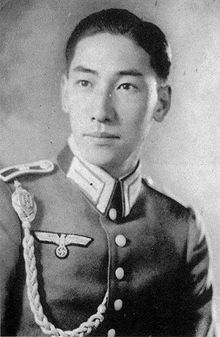Chiang Wei-kuo
| Chiang Wei-kuo 蔣緯國 |
|
|---|---|

Chiang Wei-kuo as an officer candidate in the Wehrmacht. The shoulder boards indicate the rank of Fahnenjunker (cadet).
|
|
| 4th Secretary-General of the National Security Council of the Republic of China | |
|
In office 18 June 1986 – 28 February 1993 |
|
| President |
Chiang Ching-kuo Lee Tung-hui |
| Preceded by | Wang Tao-yuan |
| Succeeded by | Shih Chi-yang |
| 12th Commander-in-Chief of the Combined Services Force of the Republic of China | |
|
In office 7 April 1980 – 30 June 1984 |
|
| President | Chiang Ching-kuo |
| Preceded by | Wang To-nien |
| Succeeded by | Wen Ha-hsiung |
| 2nd President of the Tri-service University | |
|
In office 16 August 1975 – 6 June 1980 |
|
| President |
Yen Chia-kan Chiang Ching-kuo |
| Preceded by | Yu Po-chuan |
| Succeeded by | Wang To-nien |
| 3rd President of the Republic of China Army Command and Staff University | |
|
In office 1 September 1963 – 31 August 1968 |
|
| President | Chiang Kai-shek |
| Preceded by | Wu Wen-chi |
| Succeeded by | Lu Fu-ning |
| Personal details | |
| Born | October 6, 1916 Tokyo, Empire of Japan |
| Died | September 22, 1997 (aged 80) Taipei, Taiwan |
| Awards |
|
| Military service | |
| Allegiance |
|
| Years of service |
|
| Rank |
|
| Unit |
|
| Commands |
|
| Battles/wars |
|
Chiang Wei-kuo (simplified Chinese: 蒋纬国; traditional Chinese: 蔣緯國; pinyin: Jiǎng Wěiguó, or Wego Chiang; October 6, 1916 – September 22, 1997) was an adopted son of President Chiang Kai-shek, adoptive brother of President Chiang Ching-kuo, retired Republic of China Army (ROCA) general, and an important figure in the Kuomintang (KMT). His courtesy names were Jian'gao (建鎬) and Niantang (念堂).
As one of two sons of Chiang Kai-shek, Chiang Wei-kuo's name has a particular meaning as intended by his father. "Wei" literally means "parallel (of latitude)" while "kuo" means "nation"; in his brother's name, "Ching" literally means "longitude". The names are inspired by the references in Chinese classics such as the Guoyu, in which "to draw the longitudes and latitudes of the world" is used as a metaphor for a person with great abilities, especially in managing a country.
Born in Tokyo when Chiang Kai-shek and the KMT were exiled to Japan by the Beiyang Government, Chiang Wei-kuo has long been speculated to be an offspring of Tai Chi-tao and a Japanese woman, Shigematsu Kaneko (重松金子?). Chiang Wei-kuo previously discredited any such claims and insisted he was a biological son of Chiang Kai-shek until his later years (1988), when he admitted that he was adopted.
...
Wikipedia
